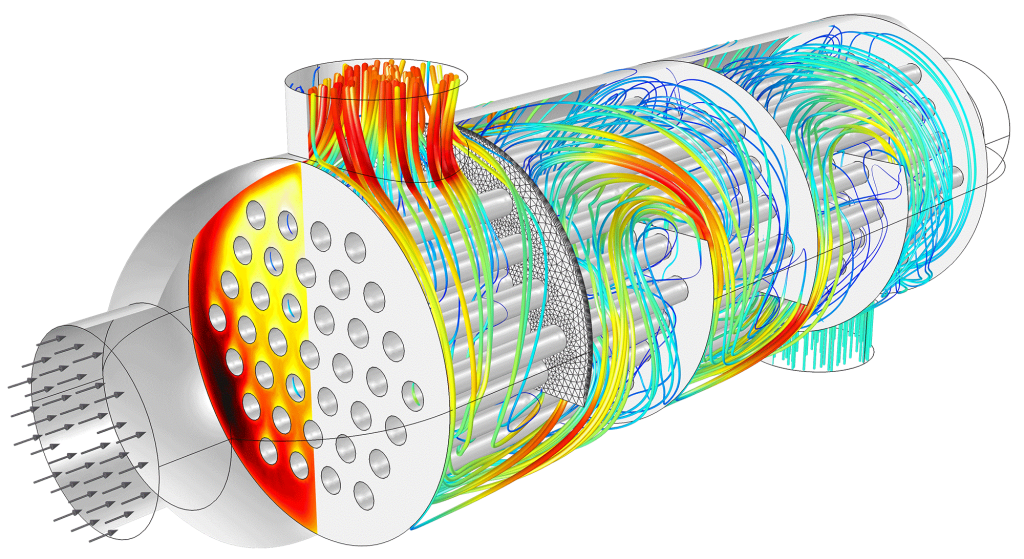
Efficient Heat Exchangers: Cutting-Edge Designs and Energy-Saving Strategies for Optimizing Air Space
2023-10-24 | Heat Exchanger
We delve into the world of heat exchangers, pivotal devices facilitating heat transfer in various fields. Heat exchangers play crucial roles not only in HVAC and heating systems but also in optimizing energy usage across industrial processes. Let's explore how professional designs and innovative technologies can optimize heat exchangers, leading to energy efficiency and high-performance operation.
1. What is a Heat Exchanger?
A heat exchanger is a device used to transfer heat energy between two fluids. The fundamental principle behind heat exchangers involves transferring heat from one fluid to another without mixing the fluids. Heat exchangers typically comprise a surface used for heat transfer, which can be in the form of pipes, plates, etc. This method of heat transfer enables highly efficient energy utilization while maintaining separation between the fluids.

Principles of Heat Exchangers
2. Optimized Design of Air and Space
In the design of heat exchangers, maximizing the utilization of limited space and optimizing airflow are crucial. Utilizing compact fluid channels enhances the heat exchange surface area, thereby improving thermal conductivity efficiency. To optimize the fluid flow inside, tools like Computational Fluid Dynamics (CFD) simulations aid designers in predicting and enhancing fluid behavior, thereby increasing system energy efficiency.
3. Efficient Filtration and Heat Exchange
Filtration is a key aspect of ensuring stable operation within heat exchanger systems. Filters within the heat exchanger obstruct particles and dust, preventing them from entering the internal components. By employing high-efficiency filters like HEPA (High-Efficiency Particulate Air) filters, tiny airborne particles are effectively removed, enhancing air quality and safeguarding the heat exchanger's internal components from contamination.
4. Professional Heat Exchanger Design and Heat Exchange Technology
Designing a heat exchanger demands profound expertise. Designers need to consider factors such as material thermal conductivity, fluid properties, and flow rates to ensure efficient operation under various conditions. Heat exchange technologies like shell and tube heat exchangers and plate heat exchangers facilitate the transfer of energy by conveying heat from one fluid to another.
5. Data-Driven Performance Optimization
Data-driven approaches play a vital role in optimizing heat exchanger performance. Real-time monitoring of the heat exchanger's operation, facilitated by sensors and monitoring systems, enables the adjustment of operational parameters based on data analysis. Intelligent heat exchangers can automatically modify operating parameters based on data, achieving optimal thermal conductivity efficiency.
6. Case Study: Energy Conservation in Industrial Facilities
Let's illustrate the application of efficient heat exchangers through a case study. A large industrial facility utilizes heat exchangers to recover waste heat, converting it into convective airflow for heating and air conditioning. By optimizing the heat exchanger design, they successfully harness energy from waste heat, transforming it into practical energy resources while reducing reliance on conventional energy sources.
7. Saving Energy for a Sustainable Future
Through rational heat exchanger design and optimization, we can achieve efficient energy utilization across various sectors. This not only reduces energy costs but also mitigates adverse environmental impacts. As a core component of thermal energy transfer, heat exchangers play an irreplaceable role in enhancing energy efficiency and optimizing space utilization.
In summary, professional design and innovative technology of high-efficiency heat exchangers maximize energy utilization within confined airspaces. By employing strategic spatial layouts, filtration designs, and heat exchange technology applications, we can achieve efficient energy transfer in diverse fields, contributing to a more eco-friendly and energy-efficient future. Let's collectively focus on the development of heat exchangers, contributing to a greener and more sustainable future!